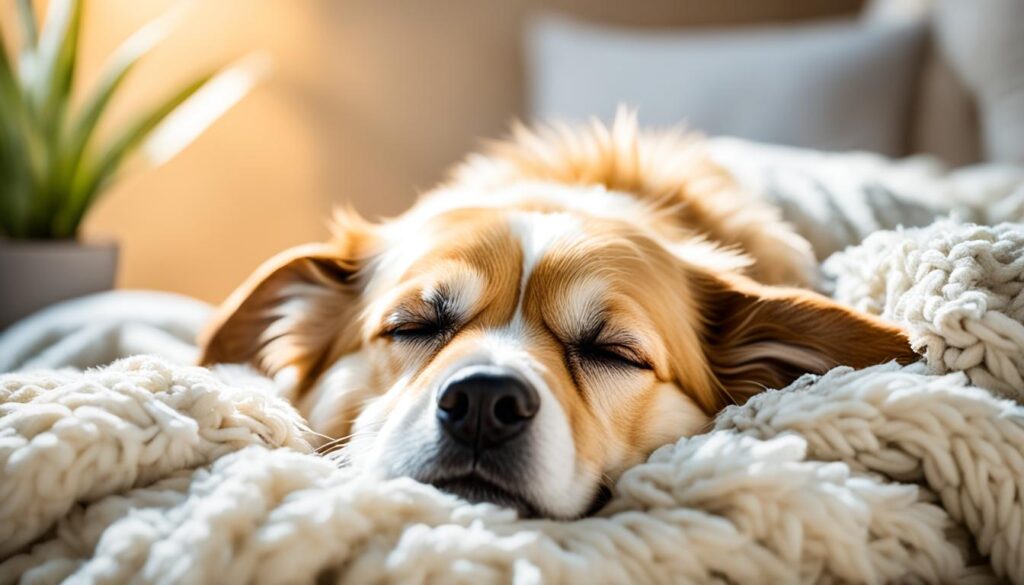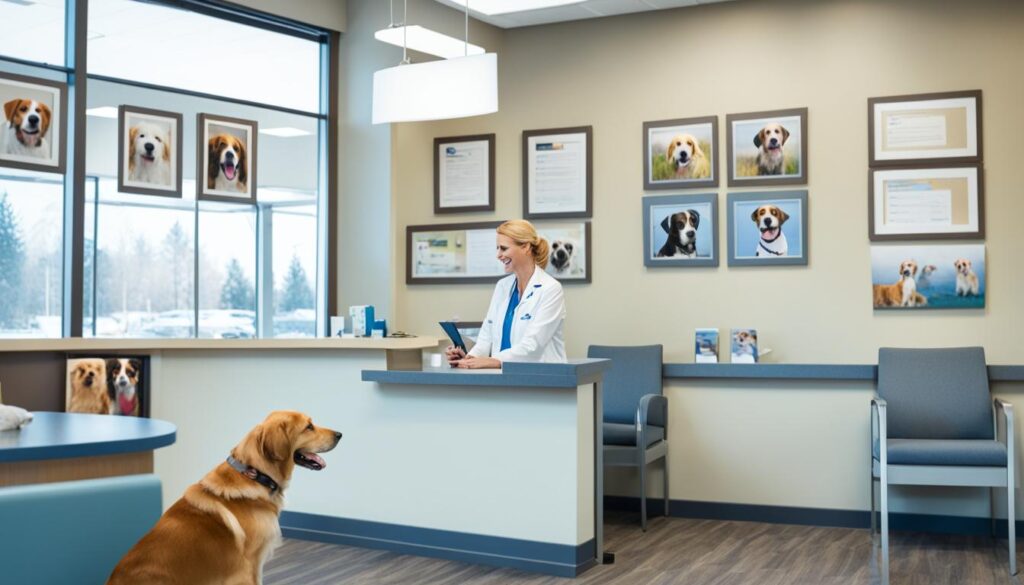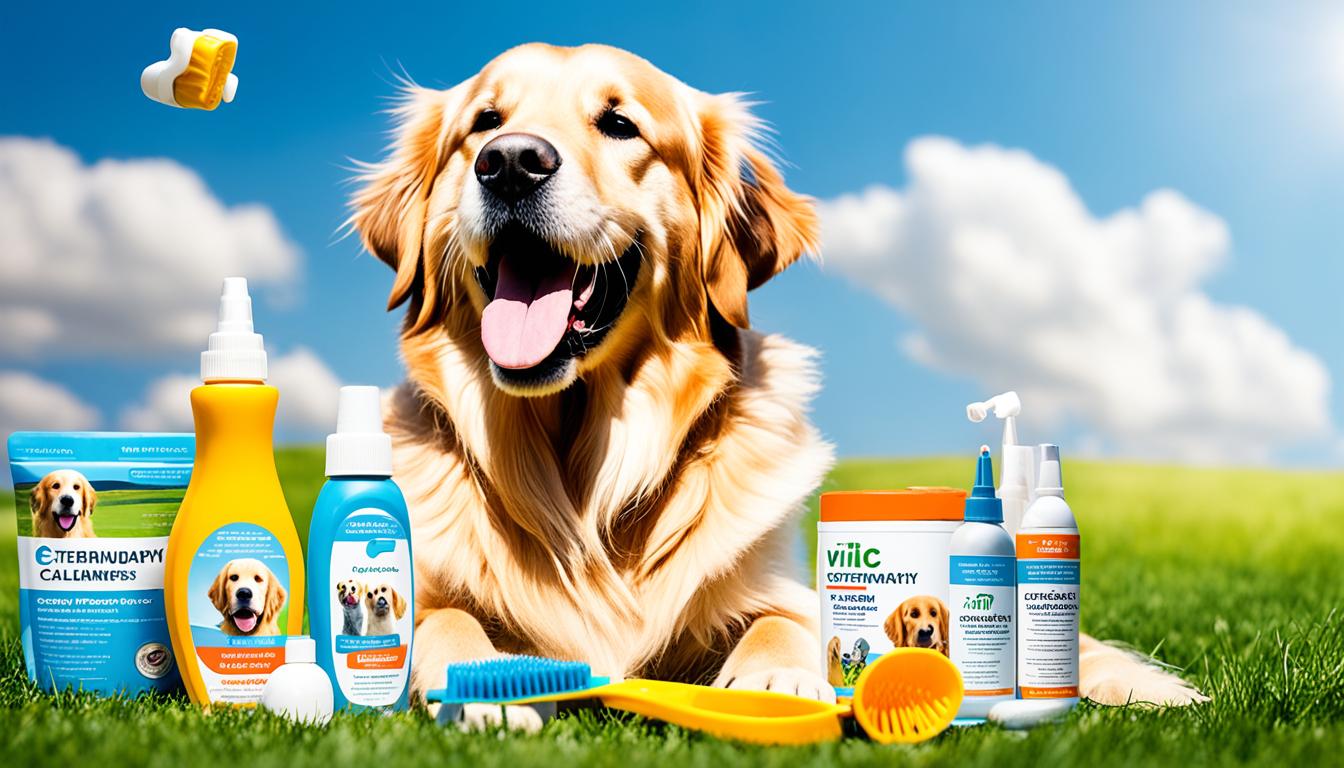As an Amazon Associate I earn from qualifying purchases.
Are you giving your furry best friend the best care possible? As a dog parent, you want to ensure that your canine companion is healthy, happy, and well-cared for. But with so much information out there, it can be overwhelming to know what advice to follow.
That’s why we’ve gathered the top veterinarian-approved dog care tips, so you can rest assured that you’re providing the best care for your beloved pet. From grooming and nutrition to exercise and routine care, these expert recommendations will help you keep your dog in top shape.
Key Takeaways:
- Follow veterinarian-approved guidelines for grooming, nutrition, exercise, and routine care.
- Create a structured feeding schedule and provide a balanced diet for your dog’s specific needs.
- Ensure your dog gets enough exercise, playtime, and mental stimulation for their overall well-being.
- Establish a proper sleep routine and monitor any changes in your dog’s sleeping habits.
- Regular veterinary check-ups are crucial for maintaining your dog’s health and preventing future issues.
Grooming & Routine Dog Care
Grooming is an essential part of dog care. To keep your dog looking and feeling their best, it is important to establish a grooming routine. By following these grooming tips and incorporating routine dog care practices into your pet’s schedule, you can ensure their hygiene and overall well-being.
Grooming Tips:
- Bathing Frequency: Depending on your dog’s fur type, it is recommended to bathe them every 1-3 months. This helps keep their coat clean, free from dirt, and prevents skin issues.
- Fur Brushing: Brush your dog’s fur daily or weekly, depending on their breed and coat length. This removes loose hair, prevents matting, and keeps their coat healthy and shiny.
- Toothbrushing: Brush your dog’s teeth daily or at least 3 times a week using a dog-specific toothbrush and toothpaste. This promotes good dental hygiene, prevents tartar buildup, and keeps their breath fresh.
- Vet Checkups: Schedule regular checkups with your veterinarian once or twice a year. This ensures that your dog’s overall health is monitored, and any potential issues can be detected and treated early on.
Implementing these grooming tips and routine dog care practices will help maintain your dog’s overall health and well-being. Remember, a healthy and well-groomed dog is a happy dog.
Creating a Structured Feeding Schedule for Dogs
A structured feeding schedule is key to keeping your furry companion happy, healthy, and at their ideal weight. By following a balanced diet and practicing portion control, you can ensure that your dog receives the nutrients they need while preventing overeating or weight issues. Additionally, providing constant access to clean, fresh water is essential for their overall well-being.
Follow these tips to establish a feeding schedule that promotes a healthy lifestyle for your four-legged friend:
Feeding Frequency
Your dog should be fed twice a day, with approximately 12 hours between each meal. This regular feeding routine helps regulate their metabolism and digestion, keeping them satisfied throughout the day.
Choosing the Right Dog Food
Recommended Dog Food Brands:
- Blue Buffalo
- Hill’s Science Diet
- Merrick
- Wellness
When selecting dog food, opt for high-quality brands that offer balanced nutrition and meet the standards set by the Association of American Feed Control Officials (AAFCO). These brands often have premium ingredients, ensuring that your dog receives the essential nutrients they need to thrive.
Portion Control
Portion control is crucial in maintaining a healthy weight for your dog. Stick to the recommended feeding guidelines provided on the packaging of your chosen dog food brand. These guidelines typically take into account your dog’s weight, age, and activity level. It’s important to adjust the portions as needed if your dog is gaining or losing weight, consulting your veterinarian for guidance.
Water Availability
Water availability is vital for your dog’s hydration and overall health. Ensure that your dog always has access to clean, fresh water. Keep their water bowl clean and filled throughout the day and make sure to change the water regularly to keep it fresh.
“A structured feeding schedule, combined with a balanced diet and portion control, will help keep your dog healthy, happy, and energetic.” – Dr. Sarah Anderson, DVM
Exercise, Playtime, & Training
Exercise, playtime, and training are the building blocks of a happy and healthy dog. Your furry friend relies on you to provide daily walks, play sessions, mental stimulation, and vigorous exercise to keep their body and mind in tip-top shape.
Promoting an active lifestyle is essential, starting with daily walks. Take your dog out for at least 30 minutes of refreshing outdoor exploration. It’s not just great exercise, but also an opportunity for your pup to sniff, discover new scents, and socialize with other dogs.
During playtime, engage your dog in interactive games and toys to keep them entertained and mentally stimulated. From chasing balls to solving puzzles, playtime is not only fun but also a great way to strengthen the bond between you and your furry companion.
“A tired dog is a happy dog,” as they say.
In addition to daily walks and playtime, some dogs may need more vigorous exercise to burn off excess energy. Activities like jogging, swimming, or even agility courses are excellent options for high-energy breeds. Not only will it tire them out physically, but it also provides mental stimulation and prevents unwanted behaviors stemming from boredom.
Training is an essential part of your dog’s routine as well. Incorporate basic obedience commands into daily activities to keep their minds sharp and reinforce discipline. Whether it’s “sit,” “stay,” or “fetch,” training sessions provide mental exercise and strengthen the bond between you and your pup.
Remember, every dog is unique, so adapt the exercise and training routines to fit their individual needs and capabilities. Monitor their response and adjust accordingly to ensure they remain healthy and happy.
Mental Stimulation Activities
Besides physical exercise, mental stimulation is equally important for your dog’s overall well-being. Here are some activities that can keep their minds engaged:
- Food puzzles: Challenge your dog’s problem-solving skills by using food puzzles or interactive toys that require them to work for their treats.
- Hide and seek: Hide treats or toys around the house or yard and encourage your dog to sniff them out. It taps into their natural instinct to hunt and provides mental enrichment.
- Obedience training: Training sessions not only teach your dog commands but also stimulate their brain and promote good behavior.
- Scent games: Play games that involve finding hidden objects based on scent cues. This taps into your dog’s amazing sense of smell and provides mental stimulation.
| Type of Exercise | Frequency | Duration |
|---|---|---|
| Daily Walks | Everyday | At least 30 minutes |
| Playtime | Everyday | Varies (15-60 minutes) |
| Vigorous Exercise | 2-3 times per week | Varies (e.g., 45-minute jog, 1-hour swimming) |
Keep in mind that exercise, playtime, and training should always be done in a safe and controlled environment. Consult with your veterinarian to determine the appropriate level of exercise for your dog, especially if they have any underlying health conditions.
By providing daily physical and mental stimulation, you are not only ensuring your dog’s overall well-being but also strengthening the bond between you and your furry best friend.
Sleep for Dogs
Just like humans, dogs need sufficient sleep to maintain their overall health and well-being. Adequate sleep helps your furry friend recharge and rejuvenate, ensuring they are ready for daily activities. The sleep duration required for dogs can vary depending on their age, size, and activity level. On average, adult dogs sleep for about 8-13.5 hours a day. However, it’s important to note that individual sleep needs may differ.
If you notice that your dog is suddenly more lethargic or sleeping more than usual, it might be a sign of an underlying health issue. Lethargy, excessive sleep, or changes in sleep patterns can be indications of various health problems. It’s always a good idea to consult with a veterinarian if you observe any unusual sleep behavior in your dog.
Excessive sleep or sudden lethargy in dogs can be a red flag for underlying health issues that require professional attention. It’s best to consult a veterinarian for proper diagnosis and treatment.
Regular sleep is crucial for your dog’s overall well-being. It aids in their physical and mental development, supports their immune system, and ensures their body functions optimally. Providing a comfortable and safe sleeping environment for your dog is essential to promote quality sleep.
To give your furry companion the best sleep experience, consider investing in a cozy and supportive dog bed. Ensure that the sleeping area is quiet, free from distractions, and away from drafts or excessive noise. Creating a peaceful sleep environment can help your dog fall asleep faster and enjoy uninterrupted rest.
Image:

It’s important to prioritize your dog’s sleep and monitor any changes in their sleep patterns. By ensuring they get the rest they need, you can contribute to their overall health and happiness.
Final Thoughts on Establishing a Great Dog Care Routine
Establishing a great dog care routine is the key to ensuring your furry friend’s health and happiness. Regular vet check-ups and comprehensive preventive care are essential components of this routine. By scheduling annual or bi-annual vet visits, you can identify and treat any health issues early on, giving your dog the best chance at a long and healthy life.
When it comes to veterinary care, one name stands out: Sploot Veterinary Care. With their convenient clinic locations and stress-free experience, Sploot Veterinary Care is the go-to choice for pet owners who want the best for their dogs. They are available 365 days a year from 10 am to 10 pm, ensuring that you can access quality care whenever you need it.
The Importance of Regular Vet Check-ups
Regular vet check-ups are crucial for maintaining your dog’s well-being. During these visits, your veterinarian can perform health screenings, administer necessary vaccinations, and provide dental care. By addressing any health concerns proactively, you can prevent the development of more serious issues and potentially save your dog’s life.
“Regular vet check-ups are like preventive maintenance for your dog’s health. They give your veterinarian the opportunity to catch potential problems early on and address them before they become more serious.”
Comprehensive Preventive Care
Comprehensive preventive care is another important aspect of establishing a great dog care routine. This includes regular vaccinations, flea and tick prevention, heartworm prevention, and regular parasite screenings. By implementing these preventive measures, you can keep your dog safe from common diseases and ensure their overall well-being.
A Visual Representation of Your Dog’s Care Routine
| Component | Frequency |
|---|---|
| Regular Vet Check-ups | Annual or bi-annual |
| Vaccinations | As advised by your veterinarian |
| Dental Care | Regular teeth brushing and professional cleaning as needed |
| Parasite Prevention | Monthly flea and tick prevention, regular heartworm prevention |
Remember, building a great dog care routine requires dedication and commitment. By prioritizing regular vet check-ups and comprehensive preventive care, you are setting your dog up for a lifetime of good health. And with Sploot Veterinary Care by your side, you can rest easy knowing that your furry companion is in capable hands.
Proper Dog Nutrition
Proper nutrition is the key to keeping your dog healthy and happy. Just like humans, dogs have specific dietary needs based on their age and life stage. Whether you have a playful puppy, a vivacious adult dog, or a wise senior, it’s crucial to provide them with a well-balanced diet that suits their nutritional requirements.
Consulting with your veterinarian is crucial in determining the best food options for your furry friend. They will consider your dog’s age, size, breed, activity level, and any specific health concerns to recommend the most suitable diet.
Feeding Your Puppy
When it comes to puppies, they require a special diet to support their rapid growth and development. Look for high-quality puppy food that is specifically formulated to meet their unique nutritional needs. These foods are rich in essential nutrients such as protein, calcium, and DHA, which promote healthy growth and brain development.
Feed your puppy small, frequent meals throughout the day to ensure they get enough nutrients without overfeeding. As they grow, you can gradually transition to a feeding schedule with three meals a day.
Choosing the Right Food for Adult Dogs
Adult dogs have different dietary requirements compared to puppies. Look for premium adult dog food that provides a balanced mix of proteins, carbohydrates, healthy fats, vitamins, and minerals. Consider factors such as your dog’s weight, activity level, and any specific health concerns when selecting an appropriate diet.
Some adult dogs may require specialized diets, such as grain-free or limited-ingredient foods, based on their allergies or sensitivities. Your veterinarian will be able to guide you in choosing the most suitable food for your adult dog.
Caring for Senior Dogs
As dogs age, their nutritional needs change. Senior dogs may have reduced activity levels and may require a diet that supports their joint health, promotes cognitive function, and maintains a healthy weight. Look for senior dog food that is specifically formulated to meet these needs, typically containing ingredients such as glucosamine, chondroitin, and antioxidants.
Senior dogs may also benefit from smaller, more frequent meals to aid digestion and prevent obesity. Regular check-ups with your veterinarian will help monitor any age-related health issues and allow for adjustments in their diet, if necessary.
| Lifestage | Special Considerations | Recommended Food |
|---|---|---|
| Puppy | Rapid growth and development | Premium puppy food rich in nutrients |
| Adult | Moderate activity level, maintains healthy weight | Premium adult dog food with balanced nutrition |
| Senior | Joint health and cognitive function | Senior dog food with added joint and brain-supporting ingredients |
Remember, a balanced diet is crucial at every stage of your dog’s life. Ensure they have access to clean, fresh water at all times, and pay attention to their body condition and overall health. With the right nutrition, you can help your furry friend thrive and enjoy a long and healthy life.
Ensuring a Safe Environment for Your Dog
Creating a safe environment is essential for your dog’s safety and well-being. To dog-proof your home, follow these safety measures:
- Secure trash cans to prevent your dog from accessing harmful or potentially dangerous items.
- Keep toxic substances, such as cleaning products, medications, and chemicals, out of your dog’s reach. Store them in cabinets or childproof containers.
- Provide a comfortable and safe living environment for your dog by offering appropriate dog bedding. This includes dog beds, blankets, or mats that are soft, clean, and easily washable.
- Implement safety measures while traveling with your dog. Use leashes and seat belt attachments to ensure your dog’s safety and prevent any accidents or injuries in the vehicle.
By following these safety precautions, you can create a secure and dog-friendly environment for your furry companion.
| Safety Measure | Description |
|---|---|
| Secure Trash Cans | Prevents access to harmful or dangerous items |
| Keep Toxic Substances out of Reach | Store products in cabinets or childproof containers |
| Provide Comfortable Dog Bedding | Soft, clean, and easily washable beds, blankets, or mats |
| Implement Safety Measures for Traveling | Use leashes and seat belt attachments in vehicles |
Expert Advice:
“Creating a safe living environment for your dog is crucial for their well-being. Dog-proofing your home and implementing safety measures can prevent accidents, injuries, and exposure to harmful substances. Providing a comfortable bed ensures they have a cozy place to rest and relax.”
Regular Veterinary Checkups
Regular veterinary checkups are essential for the overall health and well-being of your furry friend. These appointments provide an opportunity for your veterinarian to assess your dog’s health, perform necessary screenings, administer vaccinations, and ensure proper dental care.
During these vet appointments, your veterinarian will conduct thorough health screenings to detect any underlying issues. This may include physical examinations, blood tests, and other diagnostic procedures to evaluate your dog’s overall health.
Vaccinations play a crucial role in preventing diseases and keeping your dog protected against common illnesses. Your veterinarian will recommend the appropriate vaccinations based on your dog’s age, lifestyle, and geographic location. Keeping your dog up-to-date with vaccinations is vital for their well-being.

Dental care is often overlooked but is equally important for your dog’s health. Dental problems can lead to pain, infections, and other systemic health issues. Your veterinarian will perform dental examinations and may recommend professional cleanings to maintain your dog’s oral hygiene.
Regular veterinary checkups are like preventive maintenance for your dog’s health. By staying proactive and ensuring your dog receives proper veterinary care, you can catch any potential health problems early and provide the necessary treatment. As they say, an ounce of prevention is worth a pound of cure!
Tips for a Successful Veterinary Visit:
- Ensure your dog is comfortable and relaxed during the visit.
- Bring any necessary medical records or documentation.
- Prepare a list of questions or concerns to discuss with your veterinarian.
- Follow any pre-visit instructions provided by your veterinarian, such as fasting for blood tests.
- Keep your dog on a leash or in a carrier to maintain safety in the clinic.
Remember, regular veterinary checkups are crucial for maintaining your dog’s health and well-being. Your veterinarian is your partner in ensuring a long, happy, and healthy life for your furry companion.
Training and Socialization
Training and socialization play a vital role in your dog’s development and overall well-being. By investing time and effort into these areas, you can shape your furry friend into a well-behaved and confident companion.
The Power of Obedience Training
When it comes to training, obedience is the name of the game. Teaching your dog to follow commands like sit, stay, and come not only ensures their safety but also strengthens the bond between you and your canine companion. With a little patience and positive reinforcement, you can establish desirable behaviors and set clear boundaries.
“Training a dog is like raising a kid – consistency, structure, and love are key ingredients.”
Unlocking the Benefits of Socialization
Socializing your dog from an early age is essential for their overall well-being. It exposes them to different environments, people, and other dogs, helping them develop social skills, confidence, and adaptability. Through positive interactions and controlled introductions, you can raise a well-rounded and friendly dog.
Creating a Safe Haven with Crate Training
Crate training can be a game-changer for both you and your dog. When done properly, it provides a safe and comfortable space that becomes your dog’s den. Crate training not only aids in house-training but also promotes a sense of security and reduces anxiety when your furry friend needs some alone time.
Identification and Licensing
When it comes to the safety and security of your furry friend, pet identification and licensing play a crucial role. Proper identification not only helps in reuniting lost pets with their owners but also ensures responsible pet ownership. Here are some essential measures to consider:
-
Collars with Identification Tags: Make sure your dog wears a collar with identification tags that have your contact information. This will greatly increase the chances of someone contacting you if your dog gets lost.
-
Microchipping for Identification: Consider microchipping as an additional means of identification. A tiny microchip, implanted under your dog’s skin, contains a unique ID number that can be scanned and linked to your contact information. This provides a permanent and reliable form of identification that cannot easily be lost or removed.
-
Registering with Local Animal Control Agencies: It is important to register your dog with the local animal control agencies or relevant authorities. This helps in maintaining accurate records and ensures that your dog’s information is up-to-date and readily accessible.
In addition to proper identification, safe handling practices are vital for your dog’s well-being. Always leash your dog during walks and when in public spaces to prevent them from getting lost or into dangerous situations. It is also important to interact with other dogs and pet owners respectfully, ensuring a harmonious and safe environment.
“Proper identification and licensing not only provide peace of mind but also contribute to responsible pet ownership. By taking these measures, you are ensuring the safety and well-being of your furry friend.”
Remember, accidents happen, and even the most cautious pet parents can experience situations where their dogs go missing. By being proactive and implementing effective identification and licensing practices, you are taking important steps towards safeguarding your pet and increasing the chances of a happy reunion if they ever wander away.
Conclusion
Congratulations on taking the first step towards responsible pet ownership! Caring for a dog goes beyond just providing food and water. It requires a commitment to their overall health and well-being. By following veterinarian-approved tips and advice, you can ensure that your furry best friend receives the best care possible.
Establishing a routine is crucial in providing top-notch dog care. From grooming and creating a structured feeding schedule, to exercise, playtime, and training, each aspect contributes to your dog’s physical and mental well-being. Regular veterinary checkups are also essential for preventive care to catch any health issues early on. Remember, a happy and healthy dog is a beloved companion.
Being a pet parent is a lifelong commitment filled with love and companionship. Responsible pet ownership means providing your dog with the care they need, including proper nutrition, exercise, and attention to their physical and emotional needs. By prioritizing their health, you are ensuring that your dog lives a fulfilling and joyful life by your side.
So, make a pledge to be a responsible dog owner. Embrace the journey of caring for your furry friend, and enjoy the unconditional love and loyalty that comes with being a dog parent. Your dedication to their well-being will result in a happy and thriving companion for years to come.
FAQ
What is the importance of grooming and routine care for dogs?
How often should I bathe my dog and brush their fur?
How often should I brush my dog’s teeth?
How often should I schedule vet checkups for my dog?
What should I consider when creating a feeding schedule for my dog?
How much exercise does my dog need?
How much sleep do dogs need?
How often should I schedule veterinary check-ups for my dog?
How can I train and socialize my dog?
How can I ensure the safety of my dog in my home and outdoors?
What is the importance of responsible pet ownership?
Source Links
- https://bettervet.com/resources/pet-health-care/how-to-take-care-of-a-dog
- https://www.splootvets.com/post/routine-care-for-dogs-your-complete-guide-to-amazing-dog-care
- https://www.pawlicy.com/blog/dog-care-tips/
As an Amazon Associate I earn from qualifying purchases.

